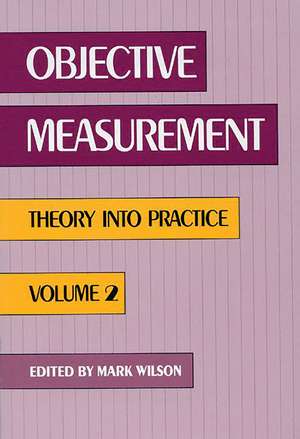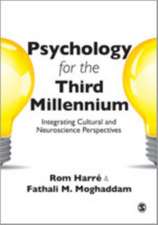Objective Measurement: Theory Into Practice, Volume 2: Objective Measurement: Theory Into Practice
Autor Mark R. Wilsonen Limba Engleză Paperback – 31 dec 1993 – vârsta până la 17 ani
| Toate formatele și edițiile | Preț | Express |
|---|---|---|
| Paperback (2) | 300.42 lei 6-8 săpt. | |
| Bloomsbury Publishing – 31 dec 1993 | 300.42 lei 6-8 săpt. | |
| Bloomsbury Publishing – 31 dec 1991 | 300.62 lei 6-8 săpt. | |
| Hardback (2) | 439.34 lei 6-8 săpt. | |
| Bloomsbury Publishing – 31 dec 1991 | 439.34 lei 6-8 săpt. | |
| Bloomsbury Publishing – 31 dec 1993 | 440.53 lei 6-8 săpt. |
Preț: 300.42 lei
Preț vechi: 366.20 lei
-18% Nou
Puncte Express: 451
Preț estimativ în valută:
57.49€ • 62.43$ • 48.29£
57.49€ • 62.43$ • 48.29£
Carte tipărită la comandă
Livrare economică 22 aprilie-06 mai
Preluare comenzi: 021 569.72.76
Specificații
ISBN-13: 9780893918439
ISBN-10: 0893918431
Pagini: 350
Dimensiuni: 156 x 235 x 20 mm
Greutate: 0.47 kg
Editura: Bloomsbury Publishing
Colecția Praeger
Seria Objective Measurement: Theory Into Practice
Locul publicării:New York, United States
ISBN-10: 0893918431
Pagini: 350
Dimensiuni: 156 x 235 x 20 mm
Greutate: 0.47 kg
Editura: Bloomsbury Publishing
Colecția Praeger
Seria Objective Measurement: Theory Into Practice
Locul publicării:New York, United States
Notă biografică
MARK WILSON is Professor of Education at the University of California at Berkeley, specializing in the areas of educational assessment, educational evaluation and applied statistics. He has published 28 articles in refereed journals, edited four books, contributed 23 chapters to edited books, and made many presentations at meetings of professional groups.
Cuprins
HISTORICAL AND PHILOSOPHICAL PERSPECTIVESFundamental Measurement and the Fundamentals of Rasch MeasurementThe Relevance of the Classical Theory of Measurement to Modern PsychologyThe Rasch Debate: Validity and Revolution in Educational MeasurementHistorical Views of the Concept of Invariance in Measurement TheoryPRACTICEComputer-Adaptive Testing: A National Pilot StudyReliability of Alternate Computer-Adaptive TestsThe Equivalence of Rasch Item Calibrations and Ability Estimates Across Modes of AdministrationConstructing Measurement with a Many-Facet Rasch ModelDevelopment of a Functional Assessment That Adjusts Ability Measures for Task Simplicity and Rater LeniencyMeasuring Chemical Properties with the Rasch ModelImpact of Additional Person Performance Data on Person, Judge, and Item CalibrationsTHEORYLocal Independence: Objectively Measurable or Objectionably Abominable?Objective Measurement with Multidimensional Polytomous Latent Trait ModelsWhen Does Misfit Make a Difference?Comparing Attitude Across Different Cultures: Two Quantitative Approaches to Construct ValidityConsequences of Removing Subjects in Item CalibrationItem Information as a Function of Threshold Values in the Rating Scale ModelAssessing Unidimensionality for Rasch MeasurementAuthor IndexSubject Index













